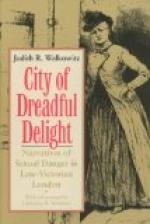“Dost thou remember him?” he asked without preliminary.
Laodice answered as if the thought were first in her mind.
“Not at all; and yet, if I could remember him, I may not discover in the man of four-and-twenty anything of the lad of ten.”
“He may not have changed. There are such natures, and, as I recall him, his may well be one of these. His disposition from childhood to boyhood did not change. When I knew him in Jerusalem, he was worthy the notice of a man. The manner he had there he bore with him to this, a smaller city, and hence to Ephesus, a city of another kind. It was good to see him examine the world, reject this and that and look upon his choice proudly. He made the schools observe him, consider him. He did not enter them for alteration, nor was he shut up in a shell of self-satisfaction. He entered them as a citizen of the world and as an examiner of all philosophy. Yet the world taught him nothing. It gave him merely the open school where regulation and atmosphere helped him to teach himself. O wife of a child, thou shalt not be ashamed of thy husband, man-grown!”
“How is he favored?” she asked with the first maiden hesitation showing in the question.
“He was slender and dark and promised to be tall. He was quick in movement, quick in temper, resourceful, aye, even shifty, I should say; stubborn, cold in heart, hard to please.”
“Fit attributes for a king,” she said, half to herself, “yet he will be no soft husband.”
Costobarus looked away from her and was silent for a time.
“Daughter,” he said finally, “thou hast learned indeed that thine is to be no luxurious life. In thy restrained heart there are no dreams. Let not thy youth, when thou seest him, put obstacle in the way of thy duty. Whether thou lovest him or lovest him not, he is thy husband, thy fellow in a great labor for God and for Israel. Remember the times and the portents and shut thine ears against selfish desire. Thou seest Judea. That which the Lord hath uttered against it through the prophets has come to pass. Abandon thy hopes in all save the Son of God; forget thyself; prepare to give all and expect nothing but the coming of the King! For verily thou lookest over the edge of the world past the very end of time!”
The solemn announcement of the Advent by this white-bearded prophet should have discovered in her a very human and terrified girl. But it was no new tidings to her. Since her earliest recollection she had heard it, expected it, contemplated it, till the magnitude and terror of it had been lost in its familiarity. She clasped her hands and dropped her eyes and her lips moved in a silent prayer.
Costobarus remained for a space sunk in glorified meditation. But presently he raised himself, with signs of his recent feeling showing on his face.
“Send hither thy mother; bid Aquila and our servants stand here before me a little later.”




